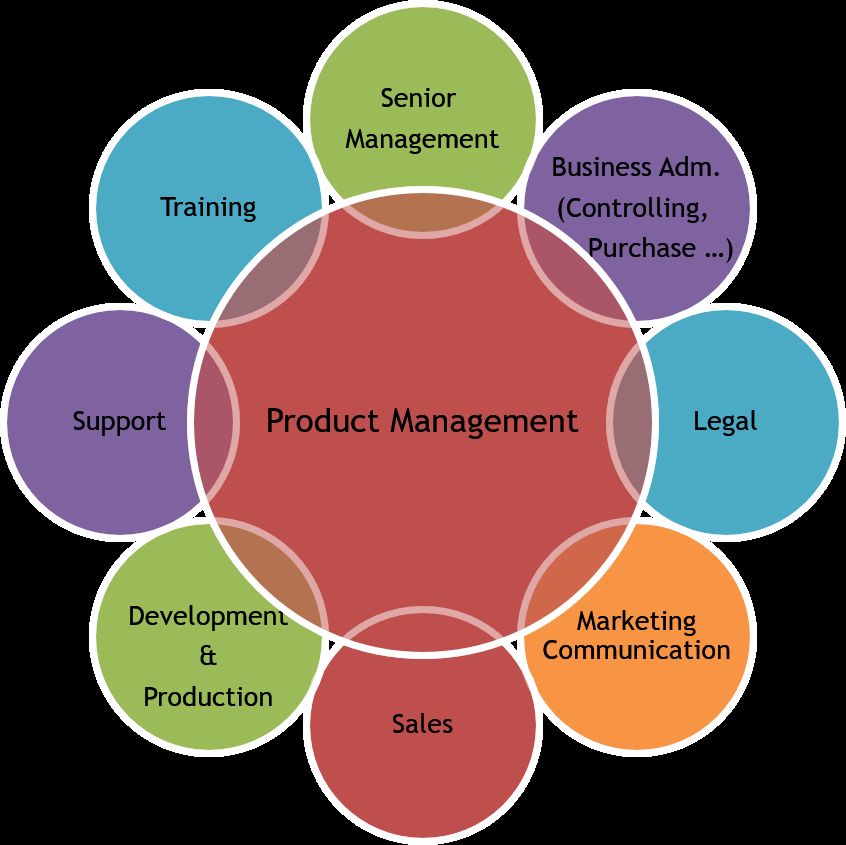What is Product Management? What does a product manager do?
The following article "What is Product Management? What does a product manager do?" is the 2nd part of an excerpt from the book "Powerful Communication for Product Managers".
For an introduction and a better understanding, read Part 1 „Product Management Problems“.
The diversity. What does a product manager do?
Product Management is the department that cooperates with most departments within the company. The following chart shows with whom we have to work and communicate as product management in the company.

The frustration. Inappropriate information, missed communication.
Many of the product managers I meet are very technical and speak the language of the engineers pretty well. Unfortunately it already ends with that.
When it comes to product launches, marketing wants to know what unique added value the new product offers the customer. How does it differentiate itself from the competition? What are the reasons why customers should buy our product?
The sales organization has similar requirements to marketing. Sales wants additional arguments that justify the price to the customer.
Product managers are often unable to name the unique added values in such a way marketing and sales need, so that end customers and the byer-persona understand them. Often the product managers cannot provide arguments as how much time and money the customer saves because they do not know the values themselves.
In the end, these colleagues complain that the sales department only sells on price.
Yes, the marketing mix has 4 P's, but the product part, the product argumentation, the added value, i.e. the one of the 4 P's, today often consists only of technological descriptions and features, because product management only speaks and understands the language of the engineers and technicians. Marketing and sales employees often tell me how dissatisfied they are with what product management in the company delivers to them. Always only technology and features that nobody understands. Finally websites, brochures and sales material only contain meaningless phrases and a lot of technical gibberish, which, incidentally, end customers don't understand either. Thus customers stay away or the selling process extends itself around a multiple.
Managers tell me something similar, supplemented with the addition, how dissatisfied they are with their product management and that this has no understanding for the market as well as for the business. At the end of the discussions with the management, it always turns out in these cases that the product managers have no knowledge of their market, that facts from the market are missing, that the results from analyses of the market are missing and therefore the business plans and decision documents are not trustworthy. This in turn leads to the management preferring to trust their own knowledge and have it implemented, which in turn leads to frustration in product management.
- Do you know what information your management needs from you and why that information is needed?
- Do you know the various purchasing decision makers and the criteria of your customers?
- Do you know which are the most common problems of market participants, what annoys and disturbs market participants and whether they are willing to pay money to solve these problems?
Read the 1st part: Product Management Problems
Overview: Articles and information for Product Managers
About the author
Frank Lemser is a trainer and founder of proProduktmanagement. He has been a market-driven evangelist since the beginning of the 2000s and since then has also been methodically involved with product management. He has developed the Open Product Management Workflow™, numerous tools for product managers, written and published books free of charge and was involved in the development of the Product Management Dashboard for JIRA. His personal goal is to solve many everyday and work problems for product managers, to professionalize and simplify the work for product managers.




















